There seems to be a lot of mass confrontations these days. My attention was drawn to one recently in the Scottish Cup between Rangers and Partick Thistle, when one side accused the other of unsporting behaviour.
It started when a Rangers player went down injured after attempting a tackle. No foul had been committed, and the referee allowed play to carry on.
But one Rangers player saw his teammate had remained on the ground and decided to kick the ball over the touch line so he could receive attention.
When it comes to the subsequent throw-in, it has become the sporting thing to do, for the player who receives the ball from the throw-in, to kick it back to the opposition goalkeeper. This is what the players at this match anticipated would happen.
However, the Partick player who received the ball from the throw-in made a mess of it and a Rangers player ran on to it and scored. This led to probably the largest mass confrontation I’ve ever seen, with 20 players taking part. Some were shaking their fist or wagging their finger at the referee or even the assistant referee.
So what is the role of the referee in all this. The first thing to say is that the Laws of the Game tell the referee if a player is only slightly injured, to allow play to continue until the ball is out of play.
If any player stays down and the ball goes to the goalkeeper, I have always stopped play. Once the injured player is seen to be OK, I have dropped the ball at the goalkeeper’s feet without letting any opponents contest for the ball. This is now permitted by the Law change for a dropped ball.
There is nothing in the Laws of the Game however, that allows the referee to intervene once the ball has crossed the touch line, even for such a reason as at the Rangers/Partick Thistle game. Although I have known referees when realising that the expected action is not being followed, blow for a ‘pretend’ foul throw.
As for mass confrontations, there is nothing in the Laws. However, in the advice section in the back of the book, referees are advised not to get involved, with the assistant referees called on to help.
Usually the three of them form a triangle looking in at the melee, where they note any players committing offences. Then when the confrontation is over, any disciplinary action required can be taken. This is what happened in Scotland with yellow cards being issued.
























